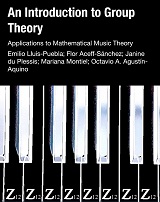
|
FreeComputerBooks.com
Links to Free Computer, Mathematics, Technical Books all over the World
|
|
- Title: An Introduction to Group Theory: Applications to Mathematical Music Theory
- Author(s) Flor Aceff-Sánchez, Octavio A. AgustínAquino; Emilio Lluis Puebla; Mariana Montiel; Janine du Plessis
- Publisher: Academic Community
- Paperback: N/A
- eBook: PDF (142 pages)
- Language: English
- ISBN-10: N/A
- ISBN-13: 978-87-403-0324-7
- Share This:

|
The success of Group Theory is impressive and extraordinary. It is, perhaps, the most powerful and influential branch of all Mathematics. Its influence is strongly felt in almost all scientific and artistic disciplines (in Music, in particular) and in Mathematics itself.
In this text, a modern presentation of the fundamental notions of Group Theory is chosen, where the language of commutative diagrams and universal properties, so necessary in Modern Mathematics, in Physics and Computer Science, among other disciplines, is introduced.
It provides answers to foundational questions about the mathematics of music accessibly yet rigorously. The examples given are all practical problems in music and audio.
This book offers a lively exploration of the mathematics, physics, and neuroscience that underlie music in a way that readers without scientific background can follow.
About the Authors- N/A
- Amazon (A Friendly Introduction to Group Theory)
- Amazon (Music and Mathematics: From Pythagoras to Fractals)
- Algebra, Abstract Algebra, and Linear Algebra
- Computer, Digital, and Mathematical Music
- General and Miscellaneous Mathematics
- Digital Signal Processing (DSP), Sound and Imaging Processing

- An Introduction to Group Theory: Applications to Mathematical Music Theory
- The Mirror Site (1) - PDF
- The Mirror Site (2) - PDF
- Mathematics and Group Theory in Music (Athanase Papadopoulos)
-
 Galois Theory (Emil Artin)
Galois Theory (Emil Artin)
French mathematician Evariste Galois developed the Galois theory of groups-one of the most penetrating concepts in modem mathematics. The elements of the theory are clearly presented in this lectures delivered by noted mathematician Emil Artin.
-
 Group Theory for the Standard Model of Particle Physics and Beyond
Group Theory for the Standard Model of Particle Physics and Beyond
This book explores the use of symmetries through descriptions of the techniques of Lie groups and Lie algebras. It develops the models, theoretical framework, and mathematical tools to understand these symmetries.
-
 Maths and Music (Julia Winterson)
Maths and Music (Julia Winterson)
There are strong links between music and mathematics. This book draws together the two disciplines outlining the key methods and concepts that underpin the subjects from one of the earliest uses of a musical cryptogram to computer music in the 21st century.
-
 Music: A Mathematical Offering (David J. Benson)
Music: A Mathematical Offering (David J. Benson)
This book provides a wealth of information to understand, at varying levels of technicality, the interplay between two ancient disciplines. A must-have book if you want to know about the music of the spheres or digital music and much in between.
-
 Mathematics and Music (David Wright)
Mathematics and Music (David Wright)
An investigation of the interrelationships between mathematics and music, reviewing the needed background concepts in each subject as they are encountered. It explores the common foundations of the two subjects, which are developed side by side.
-
 Discrete Fourier Transform (DFT): with Audio Applications
Discrete Fourier Transform (DFT): with Audio Applications
Detailed derivation of the Discrete Fourier Transform (DFT) and its associated mathematics, including elementary audio signal processing applications and matlab programming examples.
-
 Elementary Abstract Algebra: Examples and Applications
Elementary Abstract Algebra: Examples and Applications
It introduces the basic notions of group theory by a thorough treatment of important examples, including complex numbers, modular arithmetic, symmetries, and permutations, also applications to communications, cryptography, and coding theory.
-
 Abstract Algebra: Theory and Applications (Thomas W Judson)
Abstract Algebra: Theory and Applications (Thomas W Judson)
This book is designed to teach the principles and theory of abstract algebra to college juniors and seniors in a rigorous manner. Its strengths include a wide range of exercises, both computational and theoretical, plus many nontrivial applications.
-
 Algebra: Abstract and Concrete (Frederick M. Goodman)
Algebra: Abstract and Concrete (Frederick M. Goodman)
This introduction to modern or abstract algebra addresses the conventional topics of groups, rings, and fields with symmetry as a unifying theme, while it introduces readers to the active practice of mathematics.
-
 Algebra: A Computational Introduction (John Scherk)
Algebra: A Computational Introduction (John Scherk)
This book is a unique approach and presentation, the author demonstrates how software can be used as a problem-solving tool for algebra. It includes many computations, both as examples and as exercises.
|
:
|
|
 |
|
 |
|
 |
|
 |
|
 |
|
 |
|
 |
|
 |
|
 |
|
 |
|
 |
|
 |
|
 |
|
 |
|
 |
|
 |
|




